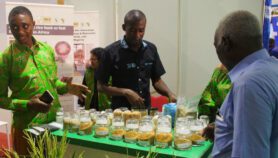Send to a friend
The details you provide on this page will not be used to send unsolicited email, and will not be sold to a 3rd party. See privacy policy.
[ABUJA] Renewable energy could meet almost 80 per cent of the world’s energy supply by 2050, and the developing world is home to more than 50 per cent of the capacity for renewable electricity, according to a report by the Intergovernmental Panel on Climate Change (IPCC).
Renewable technologies could provide power to more than two billion people in developing countries and reduce the incidence of pollution-related health problems, said the ‘Special Report on Renewable Energy Sources and Climate Change Mitigation’.
But this will only happen if policymakers create "enabling policies" for technology transfer; raising awareness of renewable technologies through communication and education, and financing their deployment.
"The IPCC report shows overwhelming scientific evidence that renewable energy can also meet the growing demand of developing countries, where more than two billion people lack access to basic energy services — and can do so at a more cost-competitive and faster rate than conventional energy sources," said Sven Teske, lead author of the report and Greenpeace International’s renewable energy director, at the launch in Abu Dhabi this week (9 May).
"Governments have to kick start the energy revolution by implementing renewable energy laws across the globe."
The report looked at bioenergy; hydropower; and solar, geothermal, ocean and wind energies. Together these provided almost 13 per cent of the global energy supply in 2008, mostly from traditional biomass used in developing countries for cooking and heating.
The deployment of such technologies is on the rise worldwide, with almost half of the new electricity capacity between 2008 and 2009 coming from renewable sources.
The main limits to making renewable the main source of the world’s energy needs are not technological, the report said, but socio-economic issues such as financing and policy.
The renewable energy technologies — some of which are already economically competitive — could aid sustainable economic development without increasing greenhouse gas emissions. And the use of domestic technologies could cut the costs of importing energy, and provide an energy supply less vulnerable to disruption and market volatility.
They can help create new jobs and provide poor rural areas with cheaper electricity, the report said. As such, they could contribute to achieving the Millennium Development Goals.
But they can have both positive and negative effects on water availability and biodiversity, and these should be considered in the planning stages. The report also called for more research into "opportunities for meeting the needs of developing countries with sustainable renewable energy services".
Ramón Pichs Madruga, a coordinating lead author of the report, said at the launch: "Developing countries have an important stake in this future — this is where most of the 1.4 billion people without access to electricity live, yet also where some of the best conditions exist for renewable energy deployment".
Teske added: "This is an invitation to governments to initiate a radical overhaul of their policies and place renewable energy centre stage. In the run-up to the next major climate conference, COP17 in South Africa in December, the onus is clearly on governments to step up to the mark."
The full report will be published on 31 May.
Link to report’s summary for policymakers
See below for an IPCC video overview of the report:













